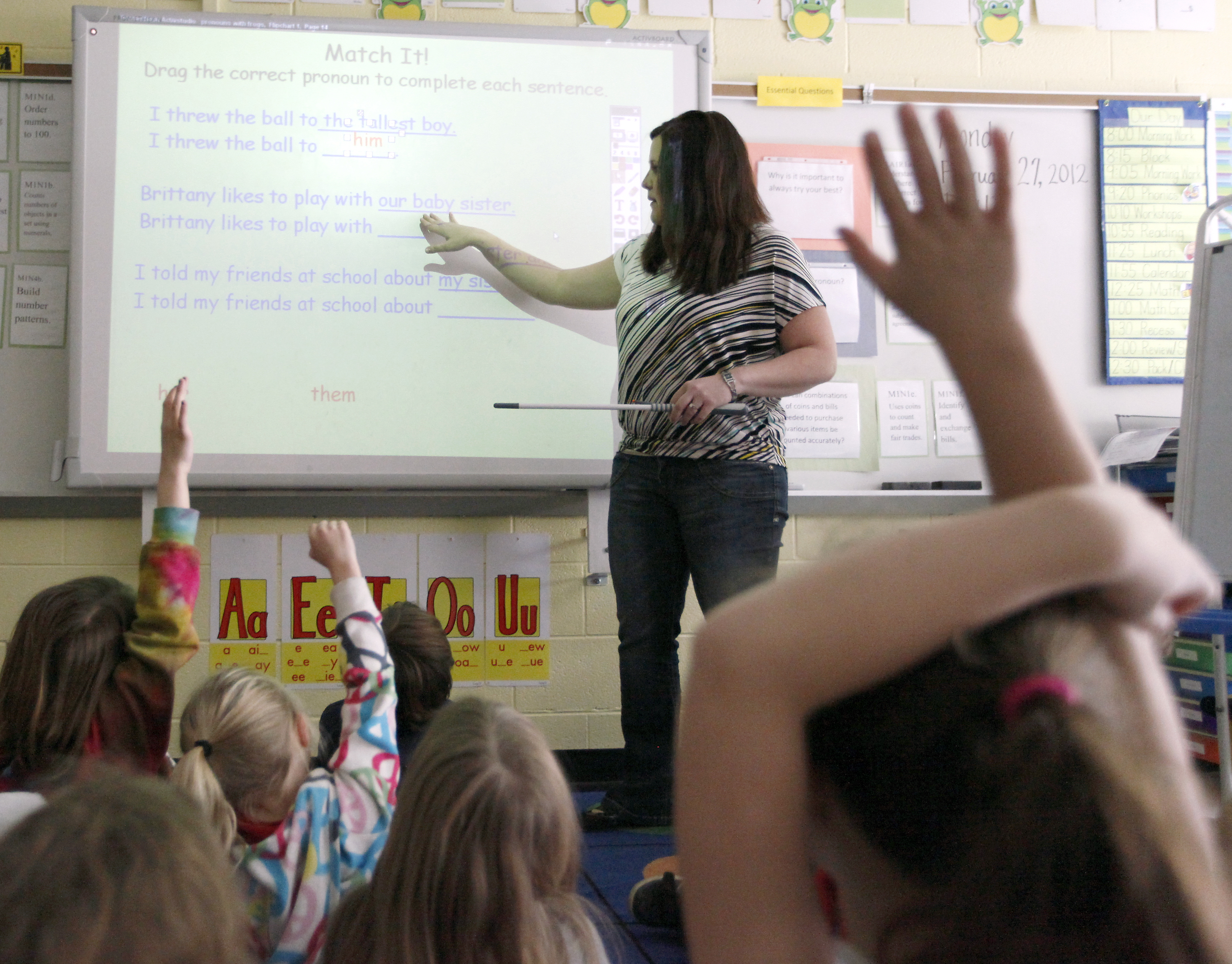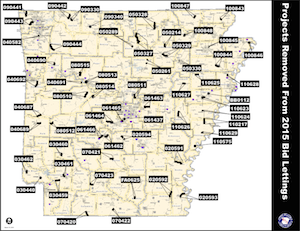 Elementary schoolteacher Lori Case uses a Promethean board to teach her class about pronouns at Dade Elementary School in Trenton, Ga., on Monday. Four North Georgia school districts, including Dade County, are participating in a pilot teacher evaluation program this week thanks to the federal Race to the Top grant.
Elementary schoolteacher Lori Case uses a Promethean board to teach her class about pronouns at Dade Elementary School in Trenton, Ga., on Monday. Four North Georgia school districts, including Dade County, are participating in a pilot teacher evaluation program this week thanks to the federal Race to the Top grant.GRANT FUNDING
Dade County Schools received $1.3 million of Georgia's $400 million in Race To The Top grant funding when the U.S. Department of Education doled out the money in 2010. Participating systems must spend 30 percent of the funding -- $390,000 in Dade's case -- on teacher effectiveness measures to be included the state's overall education reforms.
DADE COUNTY SCHOOLS
* Dade County High SchoolTeachers: 50Students: 726* Dade Middle SchoolTeachers: 31Students: 522* Dade Elementary SchoolTeachers: 45Students: 803* Davis Elementary SchoolTeachers: 26Students: 335Source: Dade County School District officials
TRENTON, Ga. -- Dade County students this week turn a critical eye on their teachers as the North Georgia school district pilots news ways to gauge teacher performance.
For the rest of the school year, Dade will be among the Georgia school systems examining teacher evaluation measures.
The current step for Dade falls to students as they fill out surveys on their teachers, according to Associate Superintendent Jody Goodroe, who is overseeing the pilot.
"The pilot is going to look at student surveys from kindergarten through 12th grade," Goodroe said.
Depending on what data shows, state officials could restrict the surveys to older students if assessments appear inaccurate or incomplete.
For kindergartners to third-graders, survey questions will be read to them, and students will answer on computers, he said.
"We're going to be asking kids, 'Are your teachers prepared to teach?'" Goodroe said. "If you ask a 15-year-old that, we feel like they can probably tell you if a teacher's prepared or not, but can a 5-year-old tell you that? According to the research, they can."
Goodroe said most teachers are accustomed to student surveys and don't object to them as long as they're used appropriately.
Dade Elementary School first-grade teacher Lori Case, one of 19 Dade teachers involved in the pilot program, said most teachers like the way the teacher evaluation development is going, even if its speed is a little scary.
Although many teachers voice concerns about how data will be used to judge performance, Case and others are heartened by the fact that a teacher's effectiveness is not judged on a single day's observation or a group of student test scores. The new evaluation tool uses much more data and a track record that gives a more realistic view, she said.
Teachers also are allowed to back up their performance with their own data.
"I like it so far because we are allowed to document what they call standards that are not seen during an observation while administrators are in the classroom," Case said.
Davis Elementary School third-grade teacher Anne Barbieri, a member of the county's implementation team who works closely with the 19 pilot teachers, said most questions are from educators who don't teach "tested subjects."
For teachers in untested subjects -- such as K-3 teachers and art, music, physical education or environmental science teachers -- 60 percent of the teacher-effectiveness measure comes from observation, 30 percent on student growth percentiles and 10 percent on student surveys.
For teachers in tested subjects -- those analyzed with the state's criterion-reference competency tests or end-of-course tests such as math, science and reading -- 50 percent of the measure's weight is based on the student growth percentiles, 40 percent on observations and 10 percent on the student surveys, according to officials.
Goodroe said most teachers are comfortable with some of the standing assessment tools; it's how they'll go together in the new evaluation instrument that makes them nervous. About 70 percent of all teachers teach subjects that are not assessed in state testing, so that group will be the target of future development, he said.
Barbieri noted that classroom supervisor observations, once always announced beforehand, now will be a surprise, at least part of the time. That prevents teachers from preparing too much for visits, Barbieri said.
"Honestly, I don't even like knowing they're coming because I freak out," she laughed.
Dade County High School American history teacher Bradley Warren, a 16-year veteran among the 19 guinea pigs, said the new evaluation instrument "gives a complete view" of a teacher's strengths and weaknesses.
"I think it's better than what they did in the past because they're looking at your overall effectiveness," Warren said.
Teachers will be more comfortable once they understand how they're being evaluated, and after teachers in nontested subjects are included, he said.
State officials are keeping the door open to changes and new ideas. Georgia Department of Education Deputy Superintendent Teresa MacCartney said the pilot will reach 5,500 teachers and 200 principals this year.
The state's 15 non-Race to the Top districts already have expressed interest in piloting or implementing evaluations next year, MacCartney said.
"We are emphasizing it is a pilot. It gives us an opportunity to see what does and doesn't work," she told reporters at a January symposium in Atlanta.
"I don't see why it hurts us to try different things as long as we're all on the same page and we all agree that, just because we try something doesn't mean we're going to use it forever," she said.
Contact staff writer Ben Benton at bbenton@timesfreepress.com or 423-757-6569.
